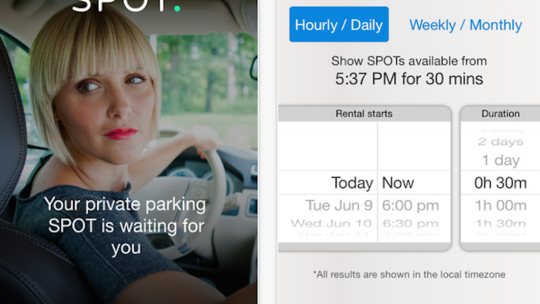
Screenshot via SPOTOne of the earliest parking startups to emerge after ill-fated Haystack was sent bloodied back to Baltimore by the City of Boston was SPOT, a platform that unlike Haystack, facilitates a private parking space transaction. Like Airbnb does with residences, SPOT lets a parking space owner rent it out to a prospective parker for a specified amount of time for an agreed upon amount of money.
SPOT officially launched in December after a beta testing period last fall. The launch came just in time for the snowiest winter in Boston's recorded history – more than 110 inches throughout the season – which essentially decimated parking in the city. In South Boston, snow banks piled so high and slimmed streets so much that several were converted to one-way only.
Even on sunny summer days parking in Boston is an agitating hassle. SPOT provides an alternative option to rare street spaces and expensive garages while also providing users with an additional income.
Now, too, with those sunny summer days in full swing SPOT is realizing that it can be even more dextrous with its clientele. That is, the parking spaces it rents out can be to those who are looking to utilize it for more than parking.
Huh?
"We are looking at a few different creative collaborations that would include theatre companies around Boston," SPOT founder and CEO Braden Golub told me. "We’ll be looking to do plays or ‘acts' in a continuous set of parking SPOTs provided by SPOT."
Non-traditional uses of parking spaces is a great way to activate the street, especially when those parking spaces are underutilized if at all parked in. Some larger companies that own entire parking lots where only a fraction of the spaces are occupied can leverage this kind of usage to the benefit of themselves, parkers, and now entertainers.
In recent years, parklets – micro parks typically built in similar situations where parking spaces either go unused or were part of a temporary, local movement to insert greenery into places where it's not prevalent – have emerged but only as what appears to be a fad.
Perhaps SPOT's foray into this kind of imaginative usage will also be a fleeting endeavor, but it's still worth it. It brings conversations to the forefront of policymakers on how to best make spaces more fruitful without alienating locals or deterring visitors the way Haystack did.
In fact, people may actually consider these performances or acts held within the bounds of a few lines painted on pavement as go-to entertainment.
This is actually emerging in Bogotá, Colombia and even aims to send a positive message to the community. Though it's taking place at bus stops, it can easily be adopted at parking spaces.
According to The Economist, "In January Bogotá’s transport office hired three troupes of actors to fan out across the city daily to educate, cajole and in some cases shame anti-social Bogotanos."
The Economist goes on to note "there is no real evidence that such tactics did much good, but they apparently did little harm."
Based on that, it seems that potential to actually do some good – whether in terms of public service or arts and culture – outweighs the possible drawbacks.
"We look at it as a fun way to bring the community together in a unique and engaging manner," said Golub.
Now imagine if SPOT is able to bring this kind of scene to more spaces across the city. It's certainly possible with the rate at which the company is growing, both in terms of its user-base and its staff.
Over 20,000 downloads of the app have occurred in Boston and because its platform isn't specific to The Hub, people are using it outside the state as far as New Jersey.
To keep up with this expansion, the SPOT team has grown to 12 staffers and the company plans to launch office in other cities nationwide. Its first stop: Chicago.
In the meantime, though, SPOT is dedicated to offering its parking solution to more neighborhoods in Boston as well as surrounding cities.
In the past 12 weeks, the lion's share of SPOT transactions, about 22 percent, have occurred in Back Bay where on average people are renting out their spaces for $15.03 per day or $2.75 per hour.
Following Back Bay is Brookline, where 18.8 percent of transactions have taken place for a cheaper rate of $10.28 per day or $1.90 per hour.
"We think this is indicative of the bigger picture…providing cheaper parking alternatives in closer proximity to where an individual is going, thus creating a more efficient city with more efficient use of the space," said Golub.
The ultimate goal is to reduce rental times to minutes as opposed to hours or days to better circulate traffic and make parking spaces even more available. But the longer a space is rented for, the more money an individual or organization earns, which bodes well for the aforementioned performances.
They can put more money in peoples' pockets, provide another layer of arts and culture for the city, and put vast pavement wastelands to good use.








